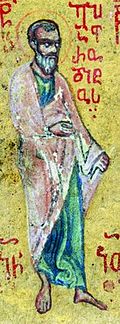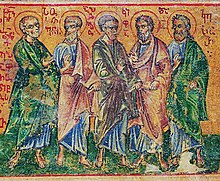Epaphroditus
Epaphroditus | |
|---|---|
 | |
| Venerated in | Orthodox Church[1] Catholic Church |
| Feast | 22 March; 30 March (Orthodox)[1] |
Epaphroditus (
Name
Epaphroditus appears in the New Testament in the letters to the
Its adjectival use is also evident in the papyrus from the late second century A.D., “during the delightful [te epaphrodeito] praefecture of Larcius Memor”.[7]
Some link Epaphroditus with another proper name in the New Testament, Epaphras (Colossians 1:7, 4:12; Philemon 23), with the suggestion that the latter is a “contracted” or “pet form” for the Philippian envoy.[8] However, this is a coincidence with no indication that it is the same person.[9]
Biography

Epaphroditus was a fellow
.Epaphroditus was the delegate of the Christian community at Philippi, sent with their gift to Paul during his first imprisonment at Rome or at Ephesus.[10] Paul, in 2:25, calls him "my brother and fellow-worker and fellow-soldier." "The three words are arranged in an ascending scale: common sympathy, common work, common danger and toil and suffering."[11] He is described as an authoritative delegate (messenger). He was sent also as minister (λειτουργός) to Paul's need (2:25), doing for Paul what the Philippian community was unable to do (2:30). The designation leitourgos derives from Greek civic use, indicating “public servant,” often one with financial resources to fulfill his functions, so Epaphroditus may have been not only an official of the Philippian church, but a person of means, able to supplement that community's gift to Paul (4:18).[12]
On his arrival, Epaphroditus devoted himself to "the work of Christ," both as Paul's attendant and as his assistant in missionary work. So assiduously did he labor that he lost his health, and in the words of Paul, "he was ill, and almost died." He recovered, however, and Paul sent him back to Philippi with this letter to quiet the alarm of his friends, who had heard of his serious illness. Paul besought for him that the church should receive him with joy and 'honour men like him' (2:29).
The Biblical commentator William Barclay suggested that Epaphroditus might be the most likely person to be identified with the unnamed arbitrator upon whom Paul called (in his epistle) to intervene in the disagreement between church members Euodia and Syntyche.
References
- ^ a b "Apostle Epaphroditus of the Seventy", Orthodox Church in America
- ^ Monks of St. Augustine Abbey. "Epaphroditus (St.), The Book of Saints, A&C Black Ltd., London, 1921
- ^ Bruce, Frederick F., 1989, Philippians, New International Biblical Commentary, New Testament Series, edited by W. Ward Gasque (Repr. Peabody, Mass.: Hendrickson, 2002), 99
- ^ Joseph H. Thayer, C. L. Wilibald Grimm, and C. G. Wilke, 1889, Greek-English Lexicon of the New Testament (Repr. Grand Rapids, Mich.: Zondervan, 1966), 229.
- ^ James Hope Moulton, and George Milligan, 1929, The Vocabulary of the Greek Testament Illustrated from the Papyri and Other Non-Literary Sources (London: Hodder and Stoughton), 230.
- ^ Lightfoot, J.B., Philippians (1868, McGrath ed. 1994) 147.
- ^ P. Ryl II. 77.36, A.D. 192.
- ^ Thayer, et al., 229; Moulton and Milligan, 230.
- ^ "Epaphroditus[...] bore a name commonly used and frequently found in ancient literature, sometimes in its shortened form, Epaphras. He was probably a different person than Epaphros mentioned in Colossians 1:7; 4:12; Philemon 23, an individual who lived in Colosse." John Walvoord, Philippians: Triumph in Christ, Everyman’s Bible Commentary (Chicago, Ill.: Moody Press), 1971, 71. Lightfoot 72. Robert W. Funk, Greek Grammar of the NT (1971) 125.
- ^ John Reumann, Philippians, AB (2008) 13-14.
- ^ Lightfoot l48.
- ISBN 978-90-04-10305-4.
